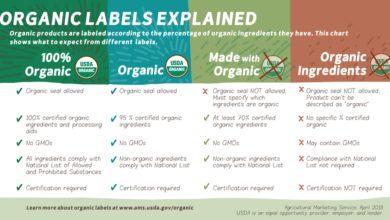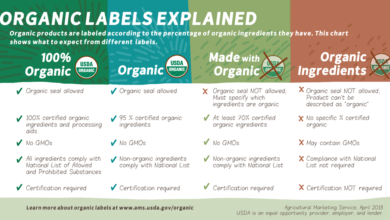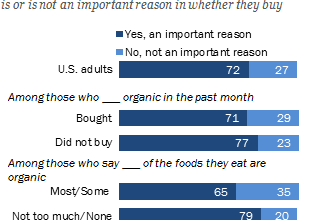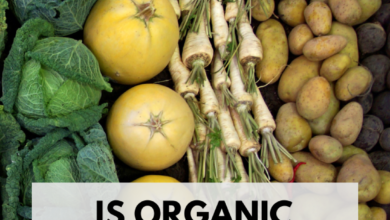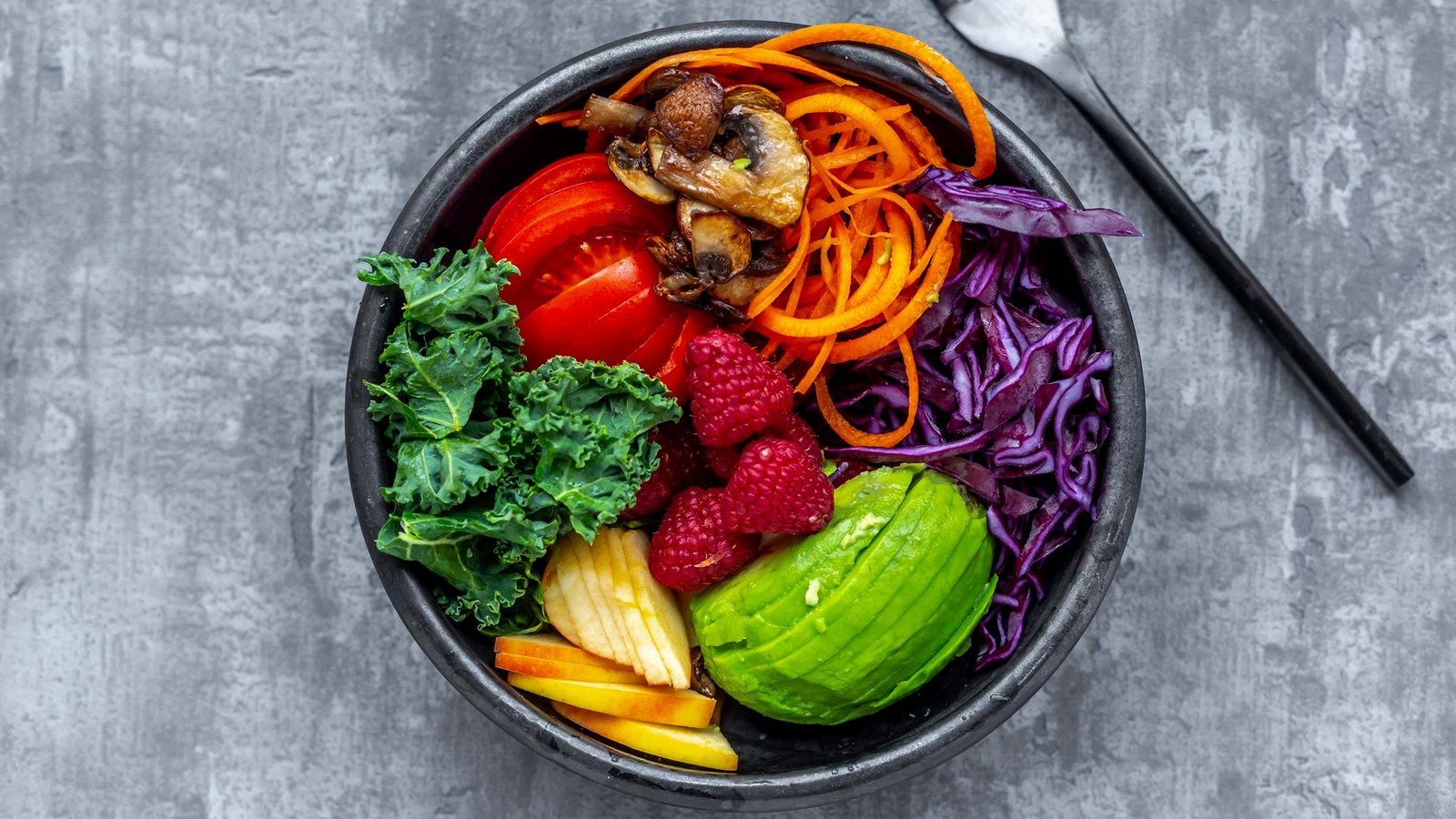
Is Eating Organic Food Better for Your Health
Yes, organic food can be better for your health. It often contains fewer pesticides and additives.
Organic food is grown without synthetic chemicals. This means fewer toxins in your diet. Many people believe organic food is healthier. It is often fresher and more nutritious. Interest in organic food has grown. People want to know if it truly benefits their health.
Organic food is often linked to improved well-being. It avoids harmful chemicals and promotes eco-friendly farming. Eating organic can reduce exposure to pesticides. It can also offer more nutrients. This shift towards organic choices reflects a desire for healthier living. But is it worth the extra cost? Is it truly better for you? Let’s explore the facts and myths surrounding organic food. Discover if it’s the healthier choice for you and your family.
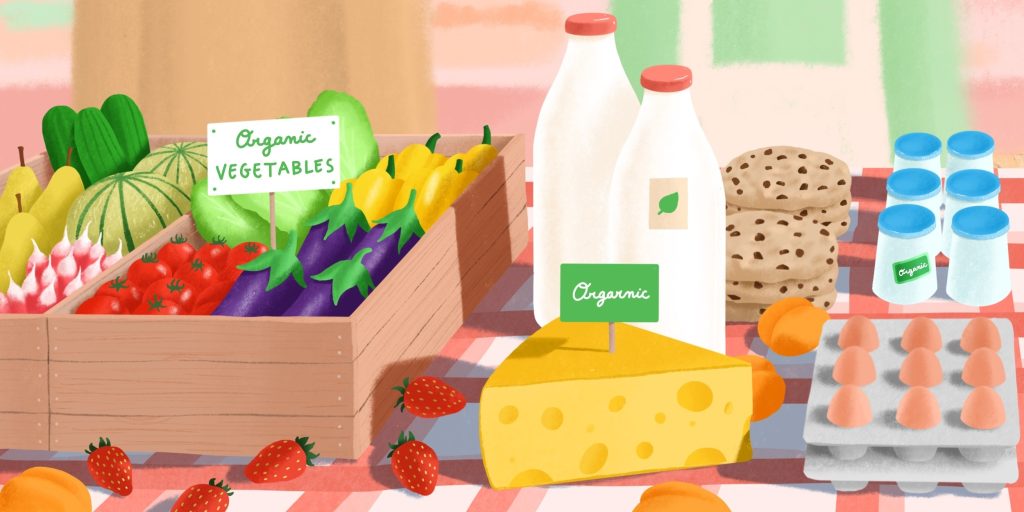
Credit: yuka.io
Organic Food Basics
Welcome to the world of organic food! You may have noticed it in the grocery aisles, with its vibrant labels and promises of purity. But what does “organic” really mean? Let’s dive into the basics of organic food and why it might be better for your health.
What Makes Food Organic?
Organic food is grown without synthetic fertilizers, pesticides, or genetically modified organisms (GMOs). Farmers use natural methods like composting and crop rotation. This means fewer chemicals on your plate.
Organic livestock are raised without antibiotics or growth hormones. They graze on organic feed and have access to outdoor spaces. This can lead to healthier meat and dairy products.
Have you ever wondered about the taste? Many people believe organic food tastes fresher and richer. It’s a chance to enjoy food as nature intended.
The Certification Process
Getting organic certification isn’t easy. Farmers must follow strict guidelines. They undergo regular inspections to ensure compliance.
The certification process varies across countries. In the U.S., the USDA manages it. They require a detailed plan and records from farmers.
It might surprise you that even packaging materials are scrutinized. This ensures every step, from farm to table, meets organic standards.
Choosing organic food means supporting sustainable practices. You’re not just buying food; you’re investing in a healthier planet. So next time you shop, think about the impact on your health and the environment. Are you ready to make a change?
Nutritional Benefits
Organic food may offer better nutritional benefits due to fewer pesticides and artificial additives. Often, organic fruits and vegetables contain higher levels of antioxidants and vitamins. Choosing organic can lead to a healthier lifestyle with more natural nutrients.
Eating organic food is a topic that sparks a lot of interest, especially when it comes to its nutritional benefits. You might be wondering if the organic label on your favorite fruits and veggies translates to better health. Does choosing organic mean you’re getting more essential nutrients? Let’s dive into the nutritional benefits of organic foods and see what they offer.Vitamins And Minerals
Organic foods often contain higher levels of certain vitamins and minerals compared to conventionally grown ones. Studies have shown that organic fruits and vegetables can have more vitamin C, iron, magnesium, and phosphorus. This could be due to the farming practices that avoid synthetic fertilizers, allowing plants to develop naturally. Take a stroll through a local farmer’s market. Notice how vibrant and colorful the produce looks. This isn’t just appealing to the eye—it often indicates a richer concentration of vitamins and minerals. Are you getting your daily dose of these essential nutrients? Choosing organic might give you that extra boost.Antioxidants Content
Another compelling reason to choose organic is their antioxidant content. Organic foods tend to have higher levels of antioxidants, which are crucial in fighting free radicals in your body. Antioxidants play a vital role in maintaining your health by protecting your cells from damage. Some studies suggest that organic produce may have up to 20% more antioxidants than their conventional counterparts. Have you ever tasted an organic tomato and noticed how flavorful it is? That rich taste often comes from those higher antioxidant levels, which also contribute to better health. Switching to organic could mean more antioxidants in your diet, helping you maintain a healthier lifestyle. Have you thought about how much your diet affects your overall well-being?Pesticide Residues
Understanding the presence of pesticide residues in food is crucial. These residues can affect our health significantly. Organic foods often claim to have fewer pesticide residues than conventional foods. But is this really the case? Let’s explore the differences and health impacts.
Conventional Vs. Organic
Conventional farming uses synthetic pesticides to protect crops. These pesticides help in controlling pests and increasing yield. But they leave residues on the food we eat. Organic farming, by contrast, limits or avoids synthetic pesticides. Farmers use natural alternatives like neem oil or insect traps. This reduces the risk of pesticide residues. As a result, organic foods usually have lower pesticide levels.
Health Impacts Of Pesticides
Consuming foods with high pesticide residues can pose health risks. Some studies link pesticides to neurological and hormonal issues. Long-term exposure can increase cancer risk. Children are especially vulnerable due to their developing bodies. Eating organic reduces these potential risks. Organic foods offer a safer option for health-conscious individuals. Lower pesticide exposure means a healthier lifestyle choice.

Credit: zoe.com
Environmental Impact
Organic food often contains fewer pesticides and additives. Many believe it can lead to better health outcomes. Eating organic may also support environmental sustainability.
Eating organic food is not just about personal health benefits; it also impacts our environment significantly. When you choose organic, you’re supporting practices that can lead to a healthier planet. Let’s look at how organic farming practices and biodiversity affect soil health and the environment.Farming Practices
Organic farming practices prioritize the health of ecosystems. Farmers use natural fertilizers like compost and manure, which enrich the soil without harmful chemicals. This method reduces pollution and conserves water, making it a more sustainable choice. Have you ever thought about the pesticides used in conventional farming? Organic farming restricts synthetic pesticides, which can contaminate water supplies and harm wildlife. By choosing organic, you support farming that protects natural resources. Organic farms often use crop rotation and cover crops to maintain soil fertility. This approach helps prevent soil erosion and encourages a balanced ecosystem. It’s a simple yet effective way to sustain the land for future generations.Biodiversity And Soil Health
Biodiversity is crucial for a resilient environment. Organic farms tend to have a higher variety of plants and animals, contributing to a balanced ecosystem. This diversity can help control pests naturally and reduce the need for chemical interventions. Healthy soil is the foundation of organic farming. Practices like crop rotation and cover cropping enhance soil structure and fertility. This not only improves crop yield but also supports microorganisms that keep the soil alive and thriving. Have you noticed how lush and vibrant organic farms look? That’s because they often have healthier soil, which retains water better and supports robust plant growth. Investing in organic food can indirectly support these positive environmental outcomes. Consider how your food choices impact more than just your health. By opting for organic, you’re taking a step towards preserving the environment. Isn’t it empowering to know that something as simple as your grocery list can contribute to a healthier planet?Cost Considerations
Organic food is often seen as a healthier choice. But there’s a key factor to consider: cost. Many people wonder if the benefits of organic food justify the price. Let’s explore the financial side of choosing organic foods.
Price Comparison
Organic food tends to cost more than conventional options. The farming methods are more sustainable but require more labor. Organic farmers don’t use synthetic pesticides or fertilizers, which increases production costs. As a result, these added expenses often lead to higher prices at the grocery store.
For instance, organic produce might be 20% more expensive. Meat and dairy products can also show similar price hikes. Shoppers may hesitate to spend extra for organic labels. It’s important to weigh these costs against potential health benefits.
Value For Money
Paying extra for organic food can make sense for some. Organic foods are free from harmful chemicals. This can lead to better health over time. Some families prioritize spending on healthier options. They see it as an investment in their well-being.
Organic farming methods can also support environmental health. This means you’re not only investing in your body. You’re contributing to a healthier planet. The value of organic food goes beyond the price tag. It includes peace of mind and long-term benefits.
Consumer Perceptions
Many consumers believe organic food is healthier due to fewer pesticides and additives. Others feel it offers better nutrition and taste. Opinions vary, but the preference for organic options continues to grow.
When it comes to buying food, consumer perceptions play a significant role in the decision-making process, especially in the context of organic versus non-organic options. Many people believe that organic foods are inherently better, driven by factors like taste, quality, and safety. But do these perceptions hold true, or are they just marketing myths?Taste And Quality
Taste can be subjective, but many people swear by the superior flavor of organic produce. Have you ever bitten into an organic apple and thought it tasted fresher and juicier? This isn’t just your imagination—organic farming practices often focus on soil health and natural growth cycles, potentially enhancing the flavor profile. Quality is another aspect where organic foods often get a nod. The absence of synthetic pesticides and fertilizers might mean you’re getting a product closer to its natural state. This can be appealing if you’re looking to enjoy food as nature intended.Safety Concerns
Safety is at the forefront of consumer concerns, especially with increasing awareness about food sources. Organic foods are grown without synthetic pesticides and fertilizers, which can be reassuring. Have you ever worried about what chemicals might be lurking in your non-organic salad? However, it’s essential to remember that organic doesn’t automatically mean pesticide-free. Organic farming allows for natural pesticides, which also need to be safe for consumption. So, the question remains: are you more comfortable with a product labeled organic, or do you prioritize knowing exactly what treatments your food has undergone? Ultimately, your perceptions and priorities will guide your choices. Do you feel that organic food truly provides a better experience in taste and safety? Or do you find peace of mind in the transparency of conventional farming practices?Long-term Health Effects
Choosing organic food often sparks a debate about its long-term health benefits. Many people are curious about whether organic products offer lasting advantages. The focus is on chronic disease prevention and gut health. These are key areas where organic food could make a difference.
Chronic Disease Prevention
Organic food may reduce the risk of chronic diseases. It contains fewer pesticides and chemicals. This means fewer toxins in your body. Studies suggest that organic diets lower the risk of heart disease. They also help in managing diabetes. Eating organic could lead to a healthier life overall. Organic foods are often richer in antioxidants. These fight off harmful free radicals. Free radicals can lead to cancer and other diseases.
Gut Health
Gut health impacts your overall well-being. Organic foods support a healthy gut microbiome. They usually contain more fiber and natural nutrients. This improves digestion and nutrient absorption. A balanced gut reduces inflammation. It also boosts your immune system. Organic farming avoids synthetic additives. This means fewer irritants for your digestive system. Eating organic might lead to fewer stomach issues.
Debates And Criticisms
People often debate if organic food is healthier. Some argue it has fewer chemicals, while others see little difference. The cost and accessibility of organic options also spark discussions.
The debate over whether eating organic food is better for your health has sparked considerable discussion. On one side, some people passionately advocate for organic food, citing its potential benefits. Others argue that the differences between organic and conventional foods are minimal. Understanding the various perspectives can help you make informed choices about your diet. ###Scientific Studies
Scientific studies on organic food often present mixed results. Some research suggests that organic food contains higher levels of certain nutrients, like antioxidants. However, other studies find no significant nutritional difference between organic and conventional produce. Consider this: a friend of mine switched to organic foods, hoping to boost her nutrient intake. She felt healthier, but later learned that her improved diet, rather than the organic label, might have made the difference. This raises an important question: Are the benefits you experience from organic foods due to their organic nature, or because they encourage a healthier lifestyle overall? ###Misinformation And Myths
Misinformation and myths abound in discussions about organic food. One common myth is that organic foods are always pesticide-free. In reality, organic farming does use pesticides, but they must be derived from natural sources. Another misconception is that organic food is always healthier. While organic products may reduce your exposure to certain chemicals, this doesn’t automatically make them healthier or more nutritious. I once bought organic cookies thinking they would be a healthier treat. Later, I realized they had just as much sugar and calories as their non-organic counterparts. This experience taught me to look beyond the organic label and focus on the actual ingredients and nutritional content. The next time you shop for groceries, ask yourself: Are you buying organic for the perceived health benefits, or because it’s part of a broader commitment to a healthy lifestyle?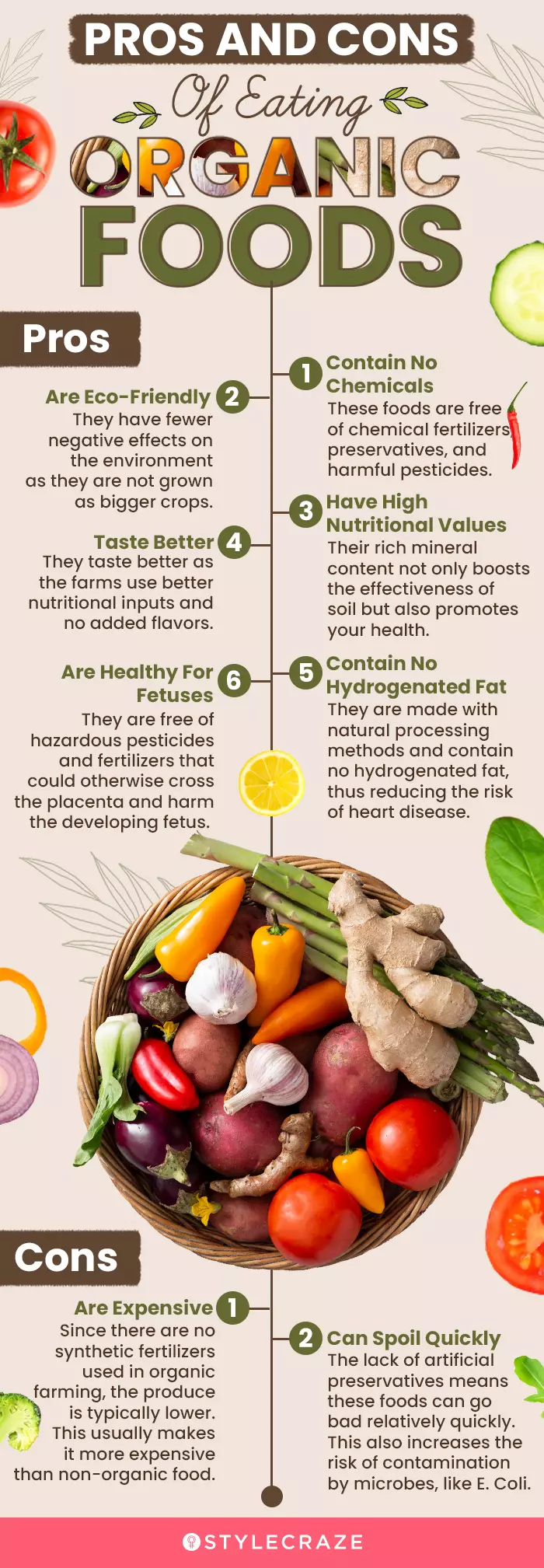
Credit: www.stylecraze.com
Frequently Asked Questions
Is Eating Organic Actually Healthier?
Organic foods may contain fewer pesticides and more nutrients. Some people prefer them for health benefits. Research is mixed, with no conclusive evidence proving organic is significantly healthier. Eating a balanced diet, whether organic or not, is essential for good health.
What Happens To Your Body If You Only Eat Organic Food?
Eating organic food may reduce exposure to pesticides and additives. It might improve nutrient intake and promote better digestion. Organic diets can support overall health and well-being. Regular consumption encourages environmentally friendly farming practices. Always consider balanced meals for optimal nutrition and health benefits.
What Are Some Disadvantages Of Organic Foods?
Organic foods often cost more due to higher production expenses. Limited shelf life can result from fewer preservatives. Availability might be restricted in some regions. Organic farming can sometimes yield less produce, impacting supply. Mislabeling issues may occur, causing confusion.
Is It Better To Eat Local Or Organic?
Eating local supports local economies and reduces carbon footprint. Organic foods avoid synthetic pesticides and fertilizers. Both options offer benefits, but local foods may not always be organic. Choose based on availability, personal values, and priorities for health and environmental impact.
Balance both for a healthier and sustainable choice.
Conclusion
Choosing organic foods can support better health. They often contain fewer pesticides. Nutrients might be higher in organic produce. Many people feel safer eating organic. This peace of mind is important. Organic farming also helps the environment. Health benefits, however, can vary per person.
It’s crucial to listen to your body. Experiment with both organic and non-organic options. Find what works best for you. A balanced diet is key. Consider your budget and preferences. Ultimately, informed choices lead to better health. Organic or not, aim for fresh and varied foods.
Your health journey is personal.



